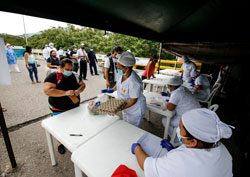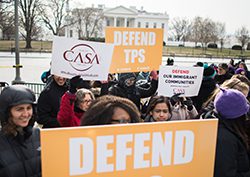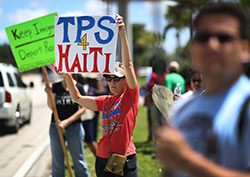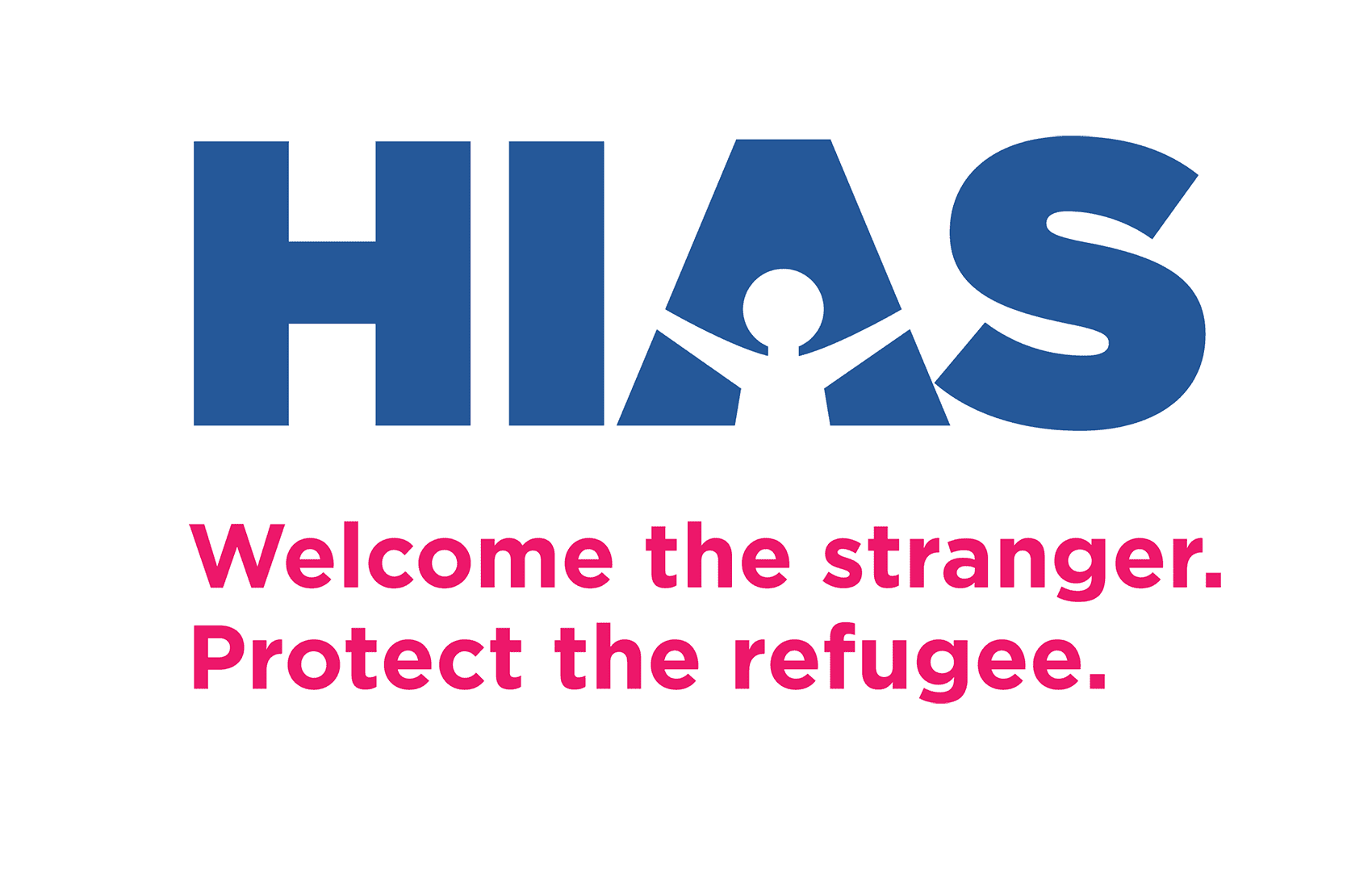What Ending TPS Could Mean for More Than 300,000 People
By Meagan Hume, Guest Contributor
Nov 07, 2017
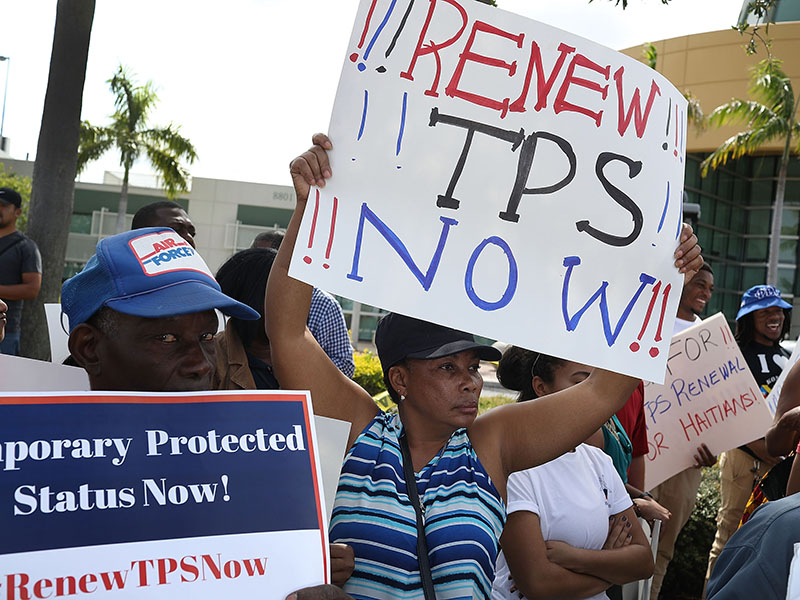
People protest the possibility that the Trump administration may overturn the Temporary Protected Status for Haitians in front of the U.S. Citizenship and Immigration Services office on May 13, 2017 in Miami, Florida.
(Joe Raedle/Getty Images)
On Monday, November 6, 2017, the Trump administration ended Temporary Protected Status (TPS) for Nicaragua and deferred a decision on Honduras, leaving nearly 60,000 lives hanging in the balance. Advocates fear that the decision to terminate TPS – a humanitarian immigration status extended to foreign nationals within the United States in the wake of natural disasters or civil wars – is the beginning of the end for the program, bringing uncertainty to nearly 330,000 individuals.
Ending Temporary Protected Status strips legal status and work authorizations for TPS recipients. Nicaraguans must now self-deport by January 5, 2019 or risk a life of fear in the United States as undocumented immigrants subject to detention and deportation.
This decision also does not bode well for the 50,000 Haitians who await a decision on their status on Thanksgiving Day, as well as 57,000 Hondurans and 195,000 Salvadorans who will learn their fate in January. In total, 261,220 recipients from eight other countries have their TPS designation up for renewal in the next two calendar years.
If forcibly returned, Salvadorans and Hondurans will face high levels of gang and cartel related violence and extortion, factors which continue to force Central Americans to flee their respective countries in order to find safety. Haitians on the other hand, would return to a country still decimated from the 2010 earthquake and struggling with endemic cholera.
Four of the remaining countries – Syria, Yemen, Somali, South Sudan – are included in the administration’s latest refugee and Muslim ban, indicating the potential reluctance of the administration to continue to provide safety for affected nationals.
273,200 U.S. citizen children have parents protected by TPS, and the termination of the program will tear families apart.
“There are two ways this could go,” said Melanie Nezer, HIAS’ Senior Vice President for Public Affairs. “Either the administration creates a massive deportation force that will be sent to immediately roundup more than 300,000 people and rip parents from their American children, or hundreds of thousands of people across the country will suddenly have no way to legally work and will live in constant fear of arrest.
“One of these two realities will result from the termination of TPS, and we will have to ask ourselves how, as Americans, we could live with either of these options.”
TPS holders from El Salvador, Haiti, Honduras, and Nicaragua have lived in the United States for decades. It is estimated that deportation of TPS recipients from these four countries could cost $3.1 billion and would be the equivalent of deporting the entire population of Pittsburgh, Pennsylvania.
TPS recipients overall have an employment rate of over 80% and are an important piece of the American workforce. The termination of TPS in its entirety would subtract $45.2 billion from U.S. GDP over a decade, and an additional $6.9 billion loss to Social Security and Medicare would be felt over the same period—a significant financial loss of contributions into programs for which TPS holders are not even eligible. These losses would be most significantly felt in Florida, New York, Texas, Maryland, and Virginia.
As a nonprofit based in the Washington, D.C. area, HIAS is especially concerned about what the stripping of TPS status could mean for our neighbors in the region. There are 46,000 TPS recipients from El Salvador, Honduras, and Haiti in Maryland and Virginia. The thousands of TPS recipients and their children are integral members of the Greater Washington, D.C. community.
They attend church, go to school, and work. In some cases, they have been in the region for decades and now are at risk of being rounded up or forced to live in the shadows. Economically, the region will lose $2.5 billion annually without these residents and the impact will be felt in the construction, food service, and waste management industries.
In response to the announcement, HIAS President and CEO Mark Hetfield said in a statement that “we must continue to call on Congress to protect not only Nicaraguan and Honduran TPS holders, but also others who could soon be forced to leave their families and return to countries that are ill equipped to accept them.
“If the administration will not reverse its decision on Nicaragua and extend TPS for other protected countries, Congress must pass bipartisan legislation to permanently protect the hundreds of thousands of TPS holders living in the United States.”
The House recently introduced two bills with differing levels of protection for the affected TPS recipients.
H.R. 4253, the proposed legislation by Representative Nydia Velazquez (D - NY),would grant permanent residency to all TPS holders. A bipartisan group of representatives from South Florida, led by Representative Carlos Curbelo (R-FL) introduced H.R. 4184, the ESPERER Act, which would extend permanent legal status for certain Haitians, Hondurans, Nicaraguans, Salvadorans.
Esperer, meaning to hope in French, and to wait in Spanish, is an apt name for TPS-related bills as it is unlikely either bill will make it out of committee.
Without immediate bipartisan Congressional action, 305,000 U.S. residents and their 273,000 U.S. citizen children could face an impossible question: remain and risk deportation or return to a dangerous country that is no longer home.
Now more than ever it is important for you to call your Members of Congress and let them know that you support Temporary Protected Status recipients and ask them to ensure that all TPS holders be allowed to remain in the United States. To locate the phone number for your representatives, click here.
You can also help by spreading the word about TPS. Use social media to raise awareness and ask your friends and family to call their elected officials, too.
The Interfaith Immigration Coalition has created a very helpful toolkit, that provides sample social media posts, in addition to op-eds, and scripts, and you can learn more about TPS holders in your state by utilizing the state-by-state fact sheets from the Center for American Progress.
Meagan Hume is HIAS' Associate for Policy and Advocacy. To learn more about HIAS' work on TPS, click here.


